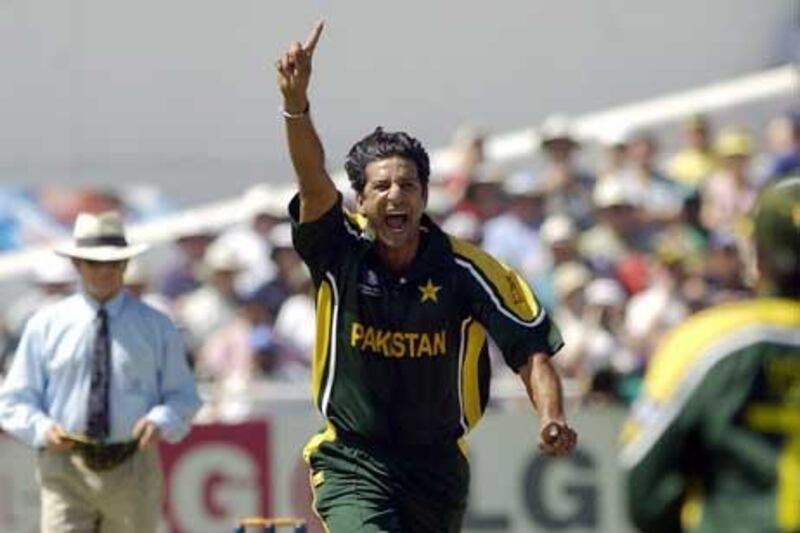Last week, the website Cricinfo announced its all-time XI selected by an eminent list of jurors. Included in the All Time World XI was just one Pakistani. He was not the country's finest cricketer - for surely Imran Khan deserves that title - but Wasim Akram was certainly its most compelling. His career was a microcosm of Pakistan cricket.
Not all Pakistan fans will cheer his selection. The Justice Qayyum report into match-fixing dented Wasim's credibility, even though he escaped without direct sanctions. It is, of course, difficult to reach definitive conclusions with partial information. But the Qayyum report's suggestion that Wasim should not captain Pakistan again left a sour taste for some fans. Hence, there are those who still believe there is too much smoke to suggest no fire; the suspicions that have swirled around have undoubtedly affected his stature.
Surprisingly, the recent criticisms on Wasim's inclusion in the all-time XI are not related to his alleged and unproven shady dealings, but stem from the fact that among the great fast bowlers, Wasim's statistics are not by any means the best, and that alone should have ruled him out of a place in the greatest ever team.
However, he also remains a hugely popular cricketer the world over and there are also good reasons for selecting him.
Certainly there was a seductive brilliance about his bowling. His legacy remains important because of the style of his bowling.
Statistics alone are never sufficient on their own to appraise the full contribution and worth of a cricketer. They do not provide us with a big picture. To understand the significance of a sportsman in part entails an ability to put their work into perspective and context.
To paraphrase a well worn saying, it is no point knowing the average of everyone and the value of no one.
If part of determining an individual's greatness is to step back and locate the individual within a wider historical canvass, then understanding the particular genius of Wasim Akram is even more important in today's age.
Over the past decade the language employed when discussing fast bowling often revolves around, "line and length", "corridor", "bowling in the right areas". The subtext is that fast bowling is about restriction, repetition and denying runs to the batsman.
The prevailing mindset is that bowling is a war of attrition, about containing, negating, wearing down the batsmen.
Wasim's bowling was the anti-thesis of this. The left-armer wanted to beat the batsman, not suffocate them. His bowling was not about waiting for an error, but it was about seizing the initiative.
His style of bowling reminded all that ambition and imagination can be as a much a part of fast bowling as precision; that bowling can be about variety not just repetition, and that it can involve inspiration as well as perspiration.
Many deliveries, many overs, many spells, exemplified this spirit. People remember how Wasim changed the course of 1992 World Cup final against England when he bowled Allan Lamb and Chris Lewis with consecutive deliveries.
He challenged conventional thinking, he was a non-conformist, an untamed maverick who reminded us that fast bowling could be subtle and full of guile.
In the current age, with the prevailing mindset as it is, his particular contribution is brought into even sharper focus.
Furthermore, he became a popular cricketer among Pakistanis because when he had the ball in his hand, there was a sense of expectation, a sense of unpredictability.
Not surprisingly, Wasim's genius was recognised and highly respected by his leading contemporaries.
Allan Border said that Wasim was the cricketer he would like to come back as. Graham Gooch said he would make his world 11 alongside Malcolm Marshall, Shane Warne and Dennis Lillee (interestingly the same bowlers that made the Cricinfo XI) and that he would rather face Michael Holding than Wasim.
Brian Lara rated him as the best he had faced, adding that "with Wasim Akram you can play the best forward defensive and he can get through that."
Whatever the controversies, it is hard not to remember fondly Wasim's bowling - the rush to the crease, the flash of the arm, the whiplash wrists, and the passionate celebrations. Wasim embodied the instinctive, free-spirited nature of Pakistan, but also its controversial side.
He was no plaster saint but if genius in a cricketing context is about imagination, improvisation, inspiration and a distinctive originality that challenges orthodoxies, all of which is married with exceptional and instinctive ability, then Wasim was a genius.
His legacy will continue to be debated and disputed. For some he will forever remain a fallen hero.
But the Cricinfo panel and his many fans may argue that the controversies cannot wash away the beauty of his bowling; his genius may have been flawed, but it was unique. And a true one-off.
Kamran Bashir is a cricket writer at PakPassion.net





